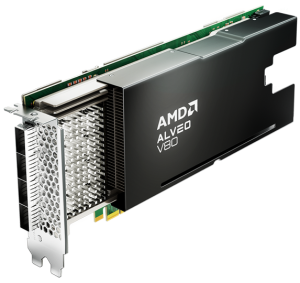
AMD recently showcased its ongoing high performance computing (HPC) leadership at ISC High Performance 2024. For the third year in a row, the Frontier supercomputer housed at Oak Ridge National Lab—powered by AMD EPYC™ CPUs and AMD Instinct™ GPUs—remains the fastest supercomputer in the world with a High-Performance Linpack (HPL) score of 1.2 exaflops based on the latest Top500 list.
The Top500 list also includes three new systems from Lawrence Livermore National Laboratories (LLNL): the El Capitan Early Delivery System, RZAdams, and Tuolumne, coming in at number 46, 47, and 48 respectively, on the Top500 list with a single cabinet early submission score of 19.65 petaflops.
These three systems are the first supercomputers on the Top500 list powered by the AMD Instinct™ MI300A APU, which was launched in December 2023. AMD now powers 156 supercomputers on the latest Top500 list, a 29 percent increase from the previous year, and 157 systems on the Green500 list of the most efficient supercomputers in the world.
“The Instinct MI300A APUs are setting the pace for innovation, delivering leadership performance and efficiency for critical workloads sitting at the convergence of HPC and AI,” said Brad McCredie, Corporate Vice President and General Manager, Data Centre and Accelerated Processing, at AMD. “We are thrilled with the progress shown by LLNL today with their early submissions using Instinct MI300A. We look forward to our continued engagement with the teams at HPE and LLNL for further optimisations to drive increased performance as we help bring up El Capitan.”
AMD-Powered Supercomputers Make Up the Next Frontier
Joining Frontier on the Top500 list, El Capitan is on track to exceed two exaflops of double precision performance and become the second supercomputer to surpass the exaflop barrier powered by AMD.
“RZAdams is a critical addition to LLNL’s existing and highly capable unclassified computing ecosystem,” said Bronis R. de Supinski, Chief Technology Officer for Livermore Computing at LLNL. “Given the boost in performance we are already seeing from the Instinct MI300A APUs, we expect this system to be a strategically significant resource and to move us forward across a wide range of scientific areas. RZAdams is supporting essential opportunities for code porting, optimisation, and software development for some of the applications that will eventually run on El Capitan. It is also allowing our scientists to push the boundaries of discovery with greater speed and efficiency than previous unclassified systems.”
New AMD Alveo V80 Accelerator for HPC and Compute-Intensive Workloads

AMD Alveo V80 Accelerator
To deliver optimised hardware-accelerated systems tailored for a wide spectrum of compute-intensive workloads, AMD launched the Alveo™ V80 Compute Accelerator Card. This new hardware adaptable accelerator is purpose-built to overcome performance bottlenecks for compute-intensive workloads with large data sets common to HPC, data analytics, and network security applications.
Powered by the AMD Versal™ HBM Series adaptive SoC, the Alveo V80 accelerator card offers up to a 2X increase in memory bandwidth and logic density and up to 4X the network bandwidth compared to the previous generation. It delivers massive hardware parallelism and 820GB/s memory bandwidth while hardware flexibility allows for real-time acceleration of diverse and custom workloads and data types for applications such as genomic sequencing, molecular dynamics, sensor processing, blockchain, and next-generation firewall and network security. Supermicro is integrating the Alveo V80 accelerator with AMD EPYC CPU-powered Supermicro servers.
Furthering the HPC and AI Ecosystem
Throughout the year, EPYC processors and Instinct accelerators have been leveraged to power many new supercomputers, including:
- Italian energy company Eni announced their new HPC6 supercomputer, powered by EPYC CPUs and Instinct GPUs. Once completed, HPC6 will be one of the world’s most powerful supercomputers dedicated to industrial applications. •
- Lenovo and the University of Paderborn recently announced plans to build a new supercomputer powered by AMD EPYC CPUs. The installation is expected to start by the second half of 2024.
- The High-Performance Computing Center of the University of Stuttgart (HLRS) has announced plans to build The Hunter system, which will be powered by the AMD Instinct MI300A accelerators.
- AGH University of Krakow unveiled a new supercomputer, powered by 4th Gen AMD EPYC CPUs, called Helios, which will be Poland’s fastest system to date.
- AMD recently released ROCm 6.1 which consists of new features and optimisations to improve the stability and performance of applications powered by the latest AMD Instinct MI300 Series GPUs.
 (0)
(0) (0)
(0)Archive
- October 2024(44)
- September 2024(94)
- August 2024(100)
- July 2024(99)
- June 2024(126)
- May 2024(155)
- April 2024(123)
- March 2024(112)
- February 2024(109)
- January 2024(95)
- December 2023(56)
- November 2023(86)
- October 2023(97)
- September 2023(89)
- August 2023(101)
- July 2023(104)
- June 2023(113)
- May 2023(103)
- April 2023(93)
- March 2023(129)
- February 2023(77)
- January 2023(91)
- December 2022(90)
- November 2022(125)
- October 2022(117)
- September 2022(137)
- August 2022(119)
- July 2022(99)
- June 2022(128)
- May 2022(112)
- April 2022(108)
- March 2022(121)
- February 2022(93)
- January 2022(110)
- December 2021(92)
- November 2021(107)
- October 2021(101)
- September 2021(81)
- August 2021(74)
- July 2021(78)
- June 2021(92)
- May 2021(67)
- April 2021(79)
- March 2021(79)
- February 2021(58)
- January 2021(55)
- December 2020(56)
- November 2020(59)
- October 2020(78)
- September 2020(72)
- August 2020(64)
- July 2020(71)
- June 2020(74)
- May 2020(50)
- April 2020(71)
- March 2020(71)
- February 2020(58)
- January 2020(62)
- December 2019(57)
- November 2019(64)
- October 2019(25)
- September 2019(24)
- August 2019(14)
- July 2019(23)
- June 2019(54)
- May 2019(82)
- April 2019(76)
- March 2019(71)
- February 2019(67)
- January 2019(75)
- December 2018(44)
- November 2018(47)
- October 2018(74)
- September 2018(54)
- August 2018(61)
- July 2018(72)
- June 2018(62)
- May 2018(62)
- April 2018(73)
- March 2018(76)
- February 2018(8)
- January 2018(7)
- December 2017(6)
- November 2017(8)
- October 2017(3)
- September 2017(4)
- August 2017(4)
- July 2017(2)
- June 2017(5)
- May 2017(6)
- April 2017(11)
- March 2017(8)
- February 2017(16)
- January 2017(10)
- December 2016(12)
- November 2016(20)
- October 2016(7)
- September 2016(102)
- August 2016(168)
- July 2016(141)
- June 2016(149)
- May 2016(117)
- April 2016(59)
- March 2016(85)
- February 2016(153)
- December 2015(150)
